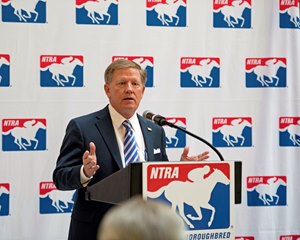Wire Act Interpretation Changes Shouldn't Impact Racing


A Department of Justice change in how it views the Wire Act is not expected to impact pari-mutuel wagering on horse racing.
In a DOJ Office of Legal Counsel opinion issued late Jan. 14, the DOJ said it replaced a 2011 opinion that the Wire Act only applied to sports betting and now sees it as applicable to any form of gambling that crosses state lines, including online gambling and online lotteries. The new opinion is similar to the DOJ's position until 2011.
Simulcast and advance-deposit wagering on horse racing is not impacted because the Wire Act includes a carve-out to allow interstate wagering on horse racing. That exception to the Wire Act's rule was in place before 2011, from 2011-18, and continues to be in place under the new DOJ opinion.
"As expected, yesterday the Department of Justice issued a lengthy opinion reversing its 2011 opinion by stating that the Wire Act applies to all forms of online wagering, not just sports wagering," said Alex Waldrop, president and CEO of the National Thoroughbred Racing Association. "This opinion does not affect our longstanding right to conduct interstate online wagering on horse racing as long as it is conducted in compliance with the Interstate Horseracing Act. We will continue to review the opinion and update the industry as this situation develops."
The Wire Act already had applied to sports wagering. States that offer online sports wagering platforms put software in place to ensure that wagers are made within state borders.
The DOJ opinion says it was asked by the Attorney General's Criminal Division to reconsider the 2011 opinion, which was issued under President Obama's administration.
The Washington Post reports that Republican donor Sheldon Adelson, a land-based casino owner, pushed for the restriction. Adelson and his allies argued interstate, online gaming could hurt children, invite criminal activity, and produce little revenue for states. The paper also said the updated opinion figures to be challenged in court.
Citing an online gaming official, the Post story speculated that the opinion change could impact interstate compacts. For instance, New Jersey, Delaware, and Nevada had recently agreed to allow poker players in all three states—which each allow intrastate online poker—to participate in games together. The story also speculated that popular interstate lotteries could be impacted.
